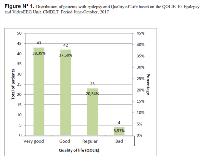Psychiatric Symptoms Comorbid in Patients With Epilepsy and Their Impact on Quality of Life: Epilepsy and VideoEEG Unit, CMDLT, Caracas,Venezuela
Abstract number :
3.261
Submission category :
6. Comorbidity (Somatic and Psychiatric)
Year :
2018
Submission ID :
502579
Source :
www.aesnet.org
Presentation date :
12/3/2018 1:55:12 PM
Published date :
Nov 5, 2018, 18:00 PM
Authors :
Anilu Daza-Restrepo, Centro Médico Docente la Trinidad; Arnoldo Soto, Centro Médico Docente la Trinidad; Guilca Contreras Caicedo, Centro Médico Docente la Trinidad; and Herman Scholtz, Centro Médico Docente la Trinidad
Rationale: The prevalence of psychiatric symptoms such as depression, anxiety and suicide risk is higher in patients with epilepsy than in the general population. Recent studies show the importance of their recognition given their high frequency, the lack of recognition and the impact they have on the quality of life, especially in epilepsy where stigma and social isolation are a predominant factor in sociocultural and economic performance from the patients. Objective: To determine the frequency of depressive symptoms, anxious and suicidal risk in patients with epilepsy and their impact on the quality of life (QoL). Epilepsy and Video-EEG Unit. CMDLT. Caracas Venezuela. Period June to October, 2017 Methods: Cross-sectional study, 112 patients where evaluated with depression (BECK-II, HADS-D), anxiety (HADS-A), suicide risk (MINI-C) and quality of life (QOLIE-10) scales. Correlations were made between: socio-demographic and clinical characteristics of the population, depression, anxiety, suicide risk and their impact on QoL with the different scales used. Results: 112 patients, 45 men (40.18%) and 67 women (40.18%), average age and time with epilepsy 35 and 19 years respectively, primary-secondary education 49.11%, singles 58.93%, work current 44.61%, Focal Epilepsy 87.5%, Generalized idiopathic epilepsy: 12.5%, frequency of generalized seizures per month (=3) 84.55%, number of AEDs 2 in 44.64%, drug resistance 56, 25%, CLZ was the FAE of greatest use 38.39%, PB 10.78% is the lowest, depression by BECK-II 37.5%, HADS-D: 12.5% (require consideration 17.86%), anxiety (HADS-A) 25% (23.21% require consideration), suicide risk 33.04%, excellent QoL 0%, very good 38.39%, good 37.50%, regular 20.54% and poor 3, 57%, QoL domain most affected was mental health 38.61%. Conclusions: Psychiatric comorbidities are frequent in patients with epilepsy and have a deleterious impact on QoL, being the major determinants: Age over 39 years; Having more than 10 years with epilepsy; Any degree of depression, anxiety and suicide risk (p<0.000). There was no direct relationship with frequency of seizures per month or with a degree of drug resistance, but they did directly influence the degrees of depression.The major determinants for anxiety (HADS-A) in our patients were: generalized epilepsy and at least one seizure per month.No direct determinants for suicide risk (MINI-C) were found, however an important relationship was found between patients with moderate to severe depressionOur results are of great value, because they allow us to elucidate mechanisms through which we can improve quality of life of our patients, not only focusing on the pharmacological pathway but also on addressing social paths to diminish the taboo on epilepsy in Venezuela and in the world, impacting directly and positively on all those aspects that are part of the life of every human being already affected in Epilepsy patients.We propose the comprehensive approach for patients with epilepsy in order to identify psychiatric comorbidities that go unnoticed in the specialized evaluation, and we emphasize the importance of considering the holistic approach of the concept about quality of life in each of our patients and understand that medical management is not the only way but also implies a set of variables that determine the day to day of what it means to live in a human being with a disease, which for this case is Epilepsy Funding: None

.tmb-.png?Culture=en&sfvrsn=8066d986_0)